When I got off the plane at O’Hare Airport in Chicago on my way home to Boston on April 15, I couldn’t believe my eyes. Televisions blaring everywhere showed my beloved city at her premier event of the year, the Boston Marathon. Everyone knows the rest of the story.
“Is this for real? How can this be?” I asked, unable at first to face the reality of what had occurred. Feelings of fear and anger followed quickly on the heels of the denial.
Leaders responded quickly: the mayor, the governor, the president. “Any responsible individuals, any responsible groups will feel the full weight of justice,” promised President Barack Obama.
What is justice? Vengeful words immediately spewed from talk shows and bloggers’ keyboards. “We must catch them alive and make them suffer as much as possible. That will pay them back for what they did,” spewed those who equate justice with revenge.
Of course, violence begets more violence. Gandhi put it succinctly: “An eye for an eye makes the whole world blind.” Paul exhorted the Romans, “Repay no one evil for evil, but take thought for what is noble in the sight of all. . . Beloved, never avenge yourselves, but leave it to God, for it is written, ‘Vengeance is mine, I will repay,’ says the Lord. (Romans 12:17,19.)”
Read the Full Article

